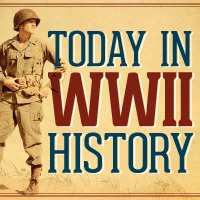Sarah Sundin's Blog, page 415
September 9, 2013
Today in World War II History
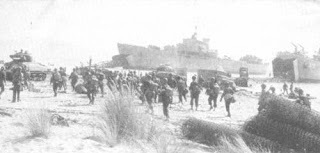 US Fifth Army landing via LST at Paestum in Salerno Bay, 9 September 1943.
US Fifth Army landing via LST at Paestum in Salerno Bay, 9 September 1943.(US National Archives)70 Years Ago—Sept. 9, 1943: Operation Avalanche: US Fifth Army and British forces land at Salerno, Italy, while British Eighth Army lands at Taranto. Luftwaffe sinks Italian battleship Roma as it tries to escape German forces occupying Italy, 1300 killed.
Published on September 09, 2013 01:00
September 8, 2013
Today in World War II History
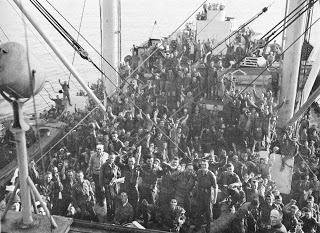 US troops en route to landing beaches at Salerno, Italy cheer the Italian surrender
US troops en route to landing beaches at Salerno, Italy cheer the Italian surrender8 September 1943 (US Center for Military History).70 Years Ago—Sept. 8, 1943: Eisenhower announces secretly negotiated Italian surrender at 6:30 pm, 9 hrs before the Allied landings at Salerno and Taranto. Germans begin to occupy Italy.
Published on September 08, 2013 01:00
September 7, 2013
Today in World War II History
Published on September 07, 2013 12:15
September 6, 2013
Today in World War II History
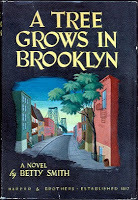 70 Years Ago—Sept. 6, 1943: New high-speed train derails at Frankfort Junction PA, 79 killed. A Tree Grows in Brooklyn by Betty Smith published. Carl Scheib, age 16, becomes youngest pitcher in American League, playing for A’s.
70 Years Ago—Sept. 6, 1943: New high-speed train derails at Frankfort Junction PA, 79 killed. A Tree Grows in Brooklyn by Betty Smith published. Carl Scheib, age 16, becomes youngest pitcher in American League, playing for A’s.
Published on September 06, 2013 01:00
September 5, 2013
Book Beat - Burning Sky by Lori Benton
 Willa Obenchain is caught between two worlds. Kidnapped by Mohawks when she was a girl, Willa is now returning to her home. But her family is dead, and the farm is about to be confiscated and sold since her parents were suspected Tory sympathizers during the American Revolution. On the edge of the property, she finds Neil MacGregor, a badly injured botanist, and she nurses him back to health. Willa and Neal struggle to make the farm profitable so can afford to purchase it herself - and to survive the winter. Meanwhile, her childhood friend Richard Waring is bent on winning Willa and the farm for himself, but something cold in his eyes makes her wary.
Willa Obenchain is caught between two worlds. Kidnapped by Mohawks when she was a girl, Willa is now returning to her home. But her family is dead, and the farm is about to be confiscated and sold since her parents were suspected Tory sympathizers during the American Revolution. On the edge of the property, she finds Neil MacGregor, a badly injured botanist, and she nurses him back to health. Willa and Neal struggle to make the farm profitable so can afford to purchase it herself - and to survive the winter. Meanwhile, her childhood friend Richard Waring is bent on winning Willa and the farm for himself, but something cold in his eyes makes her wary.Burning Sky by Lori Benton is a lushly written novel of life in early America. Willa's finely drawn character and her torn loyalties between white and native culture are fascinating, and Neil is an engaging hero, thoughtful and brave. Beautiful writing, a well-researched setting, and a gripping story make this a novel not to be missed! I highly recommend it.
*Bonus review: My daughter loved it too!
Published on September 05, 2013 02:00
Today in World War II History
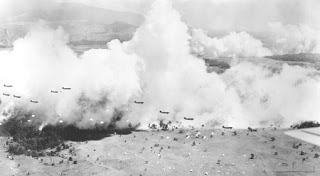 C-47s drop US 503rd Parachute Regiment at Nadzab
C-47s drop US 503rd Parachute Regiment at Nadzab(Australian War Memorial)70 Years Ago—Sept. 5, 1943: US & Australian paratroopers land in Nadzab, New Guinea to encircle Japanese; first US paratrooper action in Pacific. Penicillin is delivered to dying 15-year-old Shirley Carter in Macon GA by B-24 and police escort; she survives.
Published on September 05, 2013 01:00
September 4, 2013
Winners from the On Distant Shores Romantic Weekend Getaway Giveaway
 Thank you to the 4338 (!!!) people who entered the On Distant Shores Romantic Weekend Getaway Giveaway, and to the many people who joined me for the Facebook chat party last night. We had fun, didn't we?
Thank you to the 4338 (!!!) people who entered the On Distant Shores Romantic Weekend Getaway Giveaway, and to the many people who joined me for the Facebook chat party last night. We had fun, didn't we?I am indebted to Amy Lathrop, Audra Jennings, Caitlin Wilson, and the rest of the wonderful Litfuse Publicity Group for putting together this contest and the blog tour, and for running the Facebook party. You ladies rock!
I'm proud to announce the winner of the Romantic Weekend Getaway package ...Melanie Water Schemanski! Congratulations, Melanie! You will be contacted by e-mail for your mailing address, or you can contact Caitlin at Litfuse.
At the Facebook party, we held lots of giveaways for books and gift certificates. A full list of the winners can be found HERE. While the party is over, you can still visit the Facebook Party Page and follow the fun discussion we had. I do apologize for not keeping up with the *over 800!* comments last night. Technical difficulties slowed me down - and still keep me from responding to at least 100 of your comments. So if I didn't answer one of your questions or respond to your comments, it's not because I don't appreciate you - my computer won't LET me get far enough down in the comment stream to reply!
At the party, we also posted trivia questions about World War II and about me (the author questions could be answered from my website). We promised to post the answers here today...So here they are.
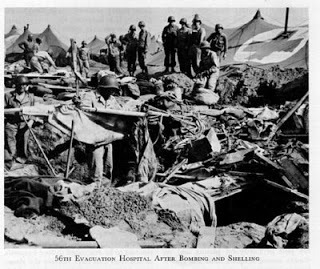 The 56th Evacuation Hospital at Anzio after an air raid
World War II Trivia:
The 56th Evacuation Hospital at Anzio after an air raid
World War II Trivia:
1. The Italian government surrendered to the Allies before the Allies invaded at Salerno. True. The Italian government's secretly negotiated surrender with the Allies was announced on September 8, 1943 at 6:30 pm, as US and British ship converged on the landing beaches at Salerno and Taranto to land in the morning of September 9. The hope was that the Italian people would welcome the Allies and push out the German troops who were present. But the Germans saw the surrender coming and immediately moved to disarm the Italian armed forces and occupy the country. So there was a fight at Salerno...and all the way until May 2, 1945.
2. When the Germans evacuated Naples, they carefully preserved the city’s facilities and artworks.False. The Germans devastated Naples, destroying the port facilities, sewage systems, aqueducts, railroads, coal supplies, and everything else they could in the hopes that the Allies would inherit a starving and rebellious population to slow their military advance. Sadly many priceless cultural works were lost.
3. One of the reasons penicillin was such a miracle drug in World War II is that it didn’t have to be refrigerated.False. Penicillin was a true wonder drug, but it's need for refrigeration did reduce its practical use on the rugged battlefields - plus it was in extremely short supply at first.
4. Gen. George Patton slapped two patients suffering from combat fatigue at US hospitals in Sicily, accusing them of cowardice.Sadly true. This great general was not a perfect man. On August 3, 1943, he slapped a patient at the 15th Evacuation Hospital in Nicosia, Sicily, and on August 10, he slapped a patient at the 93rd Evacuation Hospital in San Stefano (I fictionalized this account in On Distant Shores, adapting Patton's "dialogue" from the hospital commanding officer's account.) Both patients suffered from combat fatigue, and one had a raging case of malaria. Patton later apologized to both patients and the hospital staff.
5. On the Anzio beachhead, the Germans honored the red crosses on the US hospital tents and avoided shelling them. False. The four US hospitals at Anzio were frequent victims of both artillery shelling and air raids. Some were intentional, but most were not. Patients were known to ditch their hospital beds for the relative safety of the front lines.
 Author Trivia:
6. I started writing my first novel in 2003.False. I started writing in 2000. 7. My children are involved in tennis and karate.True! My boys do karate, and my daughter and youngest son play tennis. I'm thankful two of them have a driver's license! 8. I teach Sunday school.True. I teach fourth- and fifth-graders. So much fun! 9. I have a doctorate degree in chemistry.False. I have a bachelor's degree in chemistry and a doctorate in pharmacy. 10. Daisy, my yellow lab, never gets in trouble and is always well behaved.Completely and utterly false. Thanks again to everyone who helped me celebrate the release of
On Distant Shores
! I appreciate each one of you!
Author Trivia:
6. I started writing my first novel in 2003.False. I started writing in 2000. 7. My children are involved in tennis and karate.True! My boys do karate, and my daughter and youngest son play tennis. I'm thankful two of them have a driver's license! 8. I teach Sunday school.True. I teach fourth- and fifth-graders. So much fun! 9. I have a doctorate degree in chemistry.False. I have a bachelor's degree in chemistry and a doctorate in pharmacy. 10. Daisy, my yellow lab, never gets in trouble and is always well behaved.Completely and utterly false. Thanks again to everyone who helped me celebrate the release of
On Distant Shores
! I appreciate each one of you!
Published on September 04, 2013 08:21
Today in World War II History
 Australian troops land at Lae, New Guinea, 4 September 1943 (Australian War Memorial)70 Years Ago—Sept. 4, 1943: US and Australian troops land near Lae on New Guinea. Movie premiere of Watch on the Rhine with Paul Lukas (who wins an Oscar) & Bette Davis.
Australian troops land at Lae, New Guinea, 4 September 1943 (Australian War Memorial)70 Years Ago—Sept. 4, 1943: US and Australian troops land near Lae on New Guinea. Movie premiere of Watch on the Rhine with Paul Lukas (who wins an Oscar) & Bette Davis.
Published on September 04, 2013 01:00
September 3, 2013
Today in World War II History
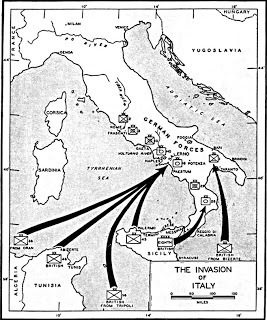 (US Army Center of Military History)70 Years Ago—Sept. 3, 1943: British Eighth Army lands unopposed in Calabria on toe of Italy at Reggio, Gallico, and Catona. (The landings at Salerno and Taranto follow on September 9). Italy signs secret armistice with Allies.
(US Army Center of Military History)70 Years Ago—Sept. 3, 1943: British Eighth Army lands unopposed in Calabria on toe of Italy at Reggio, Gallico, and Catona. (The landings at Salerno and Taranto follow on September 9). Italy signs secret armistice with Allies.
Published on September 03, 2013 01:00
September 2, 2013
Lessons from the 1940s - Labor Counts
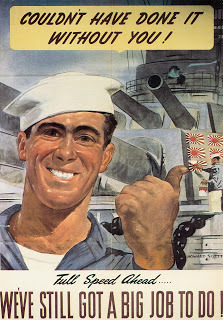 On Labor Day I thought it was appropriate to honor the vital role of production in the Allied victory in World War II.
On Labor Day I thought it was appropriate to honor the vital role of production in the Allied victory in World War II.The United States was well situated to become the "Arsenal of Democracy." Other than a handful of bombings from Japanese submarine-based planes and shellings from submarines, America was undamaged. The factories and shipyards functioned free from danger. The US also had a large industrial infrastructure with Yankee flexibility. Assembly lines for automobiles and washing machines were reconfigured to crank out jeeps and tanks. Women stepped forward to work in the factories, with 16 million women in the workforce by 1943.
Work days were lengthened and manufacturing wages rose, from an average of $25 per week in 1940 to $45.70 in 1944, while civilian prices and rents were frozen.
American industry and workers stepped up production so that by 1944, real economic output had increased 150%. By 1942, the United States produced more arms than all the Axis countries combined. As a result, America was able to keep itself and the rest of the Allies well supplied.
Dark spots existed. Despite taking a "no-strike pledge" after Pearl Harbor, unions launched many strikes that slowed production, especially in the railroads and the coal and steel industries. The threat of government takeover, public outrage, and disgust from the military ended these strikes. In June 1944, sailors on the USS Coos Bay sarcastically sent $412 in pennies to buy off the workers at the Wright aircraft factory in Ohio.
In the end, American production was a key factor in the Allied victory. By keeping the Allies suppled with arms, vehicles, planes, ships, equipment, uniforms, medical supplies, and food, the "Arsenal of Democracy" lived up to its name.
Published on September 02, 2013 07:25

